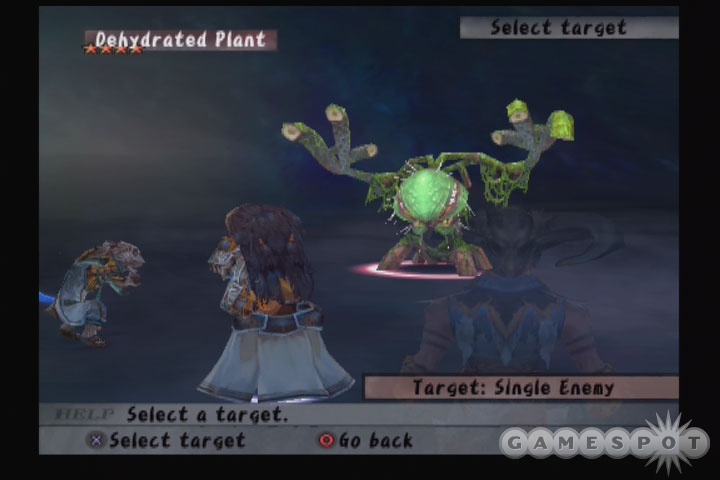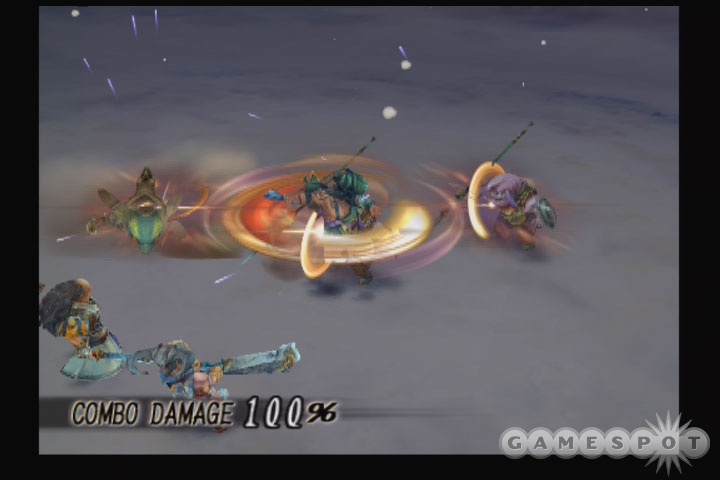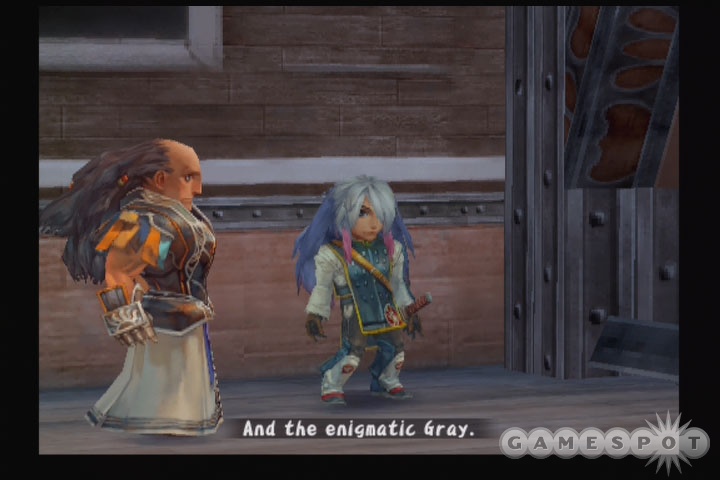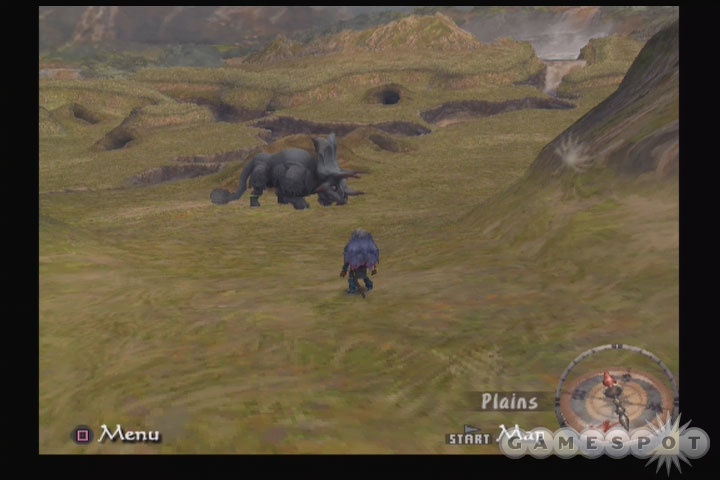Role-playing games face the challenge of taking what is usually rather tedious and boring gameplay and making it interesting through the use of compelling characters and an interesting story. After all, Final Fantasy VII didn't sell millions because of its brilliant use of random encounters. Over the years, the element of storytelling has been approached in a variety of ways, from the strictly linear to the entirely open-ended. Regardless of the way the story is told or how it ends up, it has to keep moving at a discernable pace in order to keep you playing for the 20 or 40 (or more) hours it takes to finish the game. Romancing SaGa, the latest role-playing game from Square Enix, removes the story almost entirely and replaces it with a myriad of inane fetch quests in a dull world full of lifeless characters. The game gets some of the basic role-playing mechanics right, but the pacing is all wrong.

Romancing SaGa is actually a remake of the 1992 game of the same name that was released on the SNES in Japan. The game is set in the world of Mardias, which is populated by a wide variety of people, including plains-roaming nomads, seafaring pirates, stately nobles, cave-dwelling lizardmen, and rugged barbarians. The main story goes like this: Long ago there were three gods of evil who waged war against the other, more benevolent gods. Two of the evil gods were defeated, but the third, known as Saruin, was much stronger and was only able to be defeated by Elore, the most powerful god of them all. Somehow, Elore was able to use the power of several destiny stones to seal away Saruin. When we pick up the story 1000 years later, Saruin is on the brink of breaking free of his magic bonds to unleash his evil brand of havoc upon the weak and unsuspecting people of the world.
Unfortunately, that is about as much of the story that you'll get for the entire game. There are no significant plot developments or unexpected twists, the antagonist pretty much remains a mystery, and the only sign that the world is on the brink of destruction is a sudden, unexplained rise in the monster population. When you begin the game, you can choose from eight characters, each with a different origin and storyline, but all with the same goal of saving the world. You can choose to play as Albert, a young nobleman; Aisha, a nomad girl; Gray, an adventurer; Claudia, a ranger; Jamil, a thief; Sif, a female barbarian; Hawke, a pirate; and Barbara, a traveling dancer. Depending on which character you choose, you'll get a different perspective on the main arc of the story, in addition to plenty of unique little bits of interaction with the people and places of the world. Some of the characters are a bit more fleshed out in terms of their background and story progression, but they are all fairly opaque and uninteresting. Regardless of who you choose to play as, the different stories will play out concurrently, so you'll often bump into other main characters as you're playing. You can even recruit the other characters to fight alongside of you, although the events of the story will still focus mainly on the character you chose at the beginning of the game. For the most part, you'll just travel around the world aimlessly, checking out the towns, meeting people, accepting quests, and fighting lots and lots of the same few monsters. The game takes an extremely open-ended approach to telling the story. In fact, it's too open-ended, because most of the time you are without direction or purpose, which means you have no incentive to keep slogging through battles and talking to unhelpful people in town after town.
Romancing SaGa is made up almost entirely of side quests. Sometimes you'll talk to a person in a town and he or she will tell you a story or ask you for a favor, which initiates a quest. If you want to, you can set out to complete the quest. Although, you'll often have a hard time figuring out just how that's supposed to be done because you're never given much information about what's required of you. Also, some quests require you to have certain skills, but there's no way of knowing that until you're already in the middle of the quest. For example, you might need a level-five climbing skill to reach the top of a mountain, but you won't find that out until you're already at the base of the mountain. So then you have to purchase the required skill so you can complete the quest. But in order to get the jewels to purchase the skill, you have to complete quests. So it becomes a guessing game to determine which quests you're capable of and which ones should be put off until later. Also, some quests only appear at certain times in the game, so if you miss out then you're out of luck for the rest of the game. The quests never feel important or urgent, and they aren't satisfying because they don't really fit into the context of the greater story or events. You might have to run some errands or clear some monsters out of an area, but it never feels like you have a good reason to be doing these things.

It's a shame that the pacing of the game is so screwy, because the mechanics are fairly interesting, if a bit too complicated. You can have up to five characters in your party at a time, and you'll often fight four or five enemies at once, so the battles can get pretty large. As you move around the environment, you'll see enemies roaming about, and if you bump into them you'll be drawn into combat. The enemies are really aggressive, so even though you can see where they are, it's usually pretty difficult to avoid them. If you run into a tight cluster of enemies, they'll chain together, so you'll have to fight one after the other until you've beaten them all. Also, if an enemy hits you from behind, then it will get initiative when the battle begins. Once the battle starts you can choose battle actions for each of your characters. After you've given commands to your party, you can hit go and the round of battle will play out. Your characters can have multiple weapons equipped at a time, so if you want to you can attack with a sword one turn and a bow the next turn. It's all up to you as to how you set up your character. However, carrying a bunch of weapons does weigh you down, and since you learn new battle abilities based on the weapon you use, it's often advantageous to pick one type of weapon and stick with it until you've mastered it. As you use a weapon, you'll become more experienced with it and you'll learn new and more powerful attacks. There are dozens of different attacks in the game, and it doesn't take too long to learn some powerful moves. However, using those moves will cost you battle points and durability points. Each character earns a certain number of battle points each round of combat, and each move you perform requires a certain number of points. So you might want to use a weak attack during one round to conserve your battle points so you can afford a more expensive--and more powerful--attack the next round. When using weapon-based attacks, you also have to watch your durability points. Each weapon has a set number of durability points, and performing attacks drains these points. The durability points don't regenerate, and if they reach zero, you can't use that weapon again until you have it repaired at an inn or weapon shop.
Wait, there are still more points to keep track of as you battle. Oddly, your hit points are the least important points in the game, because characters regain all their hit points after each battle. However, if your hit points reach zero during battle, you'll be knocked unconscious and you'll lose a life point. If you take damage while knocked out, you'll lose even more life points. If a character loses all his or her life points, then he or she will leave your party for good. You can replenish life points at an inn, but that isn't too convenient when you're deep in a dungeon somewhere and your characters are hanging on by a thread. You don't get many life points either, and some of the generic characters will only have three or four life points at the most. It's nice not having to worry about stocking up on tons of healing potions to fix up your party after each battle, but it's frustrating to have to stop fighting in the middle of a dungeon to go find an inn so you can keep your party members alive. Also, it isn't only fighting that affects your life points. Running from battle costs you life points, and certain traps will take life points away as well.

Battles are made more interesting by the fact that you can perform combos when you focus multiple attacks on a single target. The combos aren't anything too special, and usually they just look like two separate attacks in quick succession. The combos do inflict more damage than the individual attacks, though, so they're definitely worth trying for. There are also healing and offensive magic spells in the game, which are handy because they don't cost any durability points.
As you battle, your basic battle stats like stamina, hit points, dexterity, and charisma will increase. You'll also earn gold and jewels, which take the place of experience points. You can spend jewels to level up your characters in their particular class, which will increase their level in each of the skills that pertain to that class. For example, a pirate specializes in the foil, hand axe, and hydrology skills. By purchasing a level in the pirate class, you'll increase the level of each of those skills. You can also level up skills independently. The skills are required to use proficiencies, which you can purchase with gold earned from battles. Proficiencies are skills that you can use when in the field, but not in battle. So for example, a dungeon may have a lot of traps, so you'll want to spend some money to learn the disarm-traps proficiency. However, merely having that proficiency doesn't protect you against all traps. You'll have to have a high enough level in your search skill to disarm advanced traps. But as mentioned earlier, skill levels cost jewels, which aren't always easy to come by, especially later in the game when the levels get more and more expensive.
All the points, skills, and proficiencies seem intimidating at first, but once you get the hang of battles, it's fairly easy to keep track of everything. The complexity doesn't necessarily add depth to the game, though; it just makes character management that much more tedious and unappealing. It also doesn't help that the interface is rather dense and a bit too fancy to be functional.
Aside from the interface, the look of the game is pretty average. The battle effects are as flashy as you'd expect from a Square Enix game, but they aren't exactly breathtaking. The battlefields are completely vacant in some places, and the dungeons are about as uninteresting as can be. The textures are all flat, and when you get up close you'll see plenty of blurry, dull colors. The characters are nicely detailed, but the design is strange. The characters look deformed, with small bodies and large heads. The faces are somewhat realistic, though the eyes are still large and disproportional. It's an odd style that makes the characters look like creepy little animated dolls. The characters do not look tough or particularly appealing; they just look weird.

The sound is the best part of Romancing SaGa. The intro song is a folkie tune with Japanese lyrics that you'll probably find yourself humming along with. The battle music does its job of staying in the background and not putting you to sleep, and the music in each town ranges from soft, simple melodies to pleasant orchestrated tracks. Every bit of dialogue in the game is fully voiced, but for the most part, the delivery and the dialogue are bland and uninspired. It's also a bit of a pain to have to wait for the characters to finish speaking each time you talk to them. You can hit the circle button to speed the conversation up, but that option isn't always available.
Romancing SaGa is ultimately a role-playing game without any substance. The story is almost nonexistent, and the characters all feel stunted and generic. You can easily spend 20 hours or more on each character's campaign if you try to complete each and every quest. However, the game doesn't give you any compelling reason to make that kind of commitment.